#House of Valois-Angouleme
Explore tagged Tumblr posts
Text

Reign 2013-17
Toby Finn Regbo as Francis Valois
#francis de valois#toby regbo#reign#multicolor#happy birthday#king of france#xvi century#france#renaissance#house of valois#house of medici#catherine de medici#henry valois angouleme#king henry ii#beautiful#january 19th#alan stivell#the king of the fairies#Spotify
9 notes
·
View notes
Note
Having seen your post showing anti-Targaryens try to grasp at anything, I want to say that clearly some if not all of them love to forget and/or ignore that there have been many women in real history, whether it's Ancient Rome or the medieval era in Europe, who were married at younger ages than 16 or even 14. I can even list a few off the top of my head.
Agrippina the Younger, mother of Emperor Nero, 13 years old when she was married to her first husband Gnaeus Domitius Ahenobarbus (although thankfully she was 22 when she gave birth to Nero).
Isabella of Angouleme, 12 or 14 years old when she was married to John of England.
Isabella of France, 12 years old when she was married to Edward II of England.
Isabella of Valois, 6 years old when she was married to Richard II of England.
These are only four examples, but I'm confident that there's many others in history who were married off so young like them. Knowing that this was a very real thing in real life centuries before, and the fact that Isabella of Valois's marriage at her extremely young age occurred when the Wars of the Roses, the succession wars fought in England that were used as inspiration for some of the events of Game of Thrones, were just beginning, makes me wonder just how much anti-Targaryens, pro-Team Greens, to name a few, love to cherry-pick for their own benefits. I'm honestly really glad I found your account because after the blasphemy that was Episode 5 of House of the Dragon (I was so angry at how Daemon and Alyssa were treated there that I wrote one of the longest rants I had ever had in my life), I'm solidly Team Black and pro-Targaryen.
Yes to all that! Well listen, I'm glad you like my content on HOTD and I hope that continues to be the case. In any case, I have the impression that anti-Targaryens have a real problem with historical contextualization and the fact that the universe is generally a fantasy with its own rules. Chatting with them is really a waste of time.
#house targaryen#pro house targaryen#pro targaryen#hotd#anti hotd#house of the dragon#anti house of the dragon#f&b#fire and blood#f&b spoilers#asoiaf#a song of ice and fire#got#game of thrones#anti got#anti game of thrones#team blacks#team black#pro team blacks#pro team black#daemon targaryen#pro daemon targaryen#the rogue prince#alyssa targaryen#daemyra#pro daemyra#daenyra#daemon x rhaenyra#daemon and rhaenyra
35 notes
·
View notes
Text



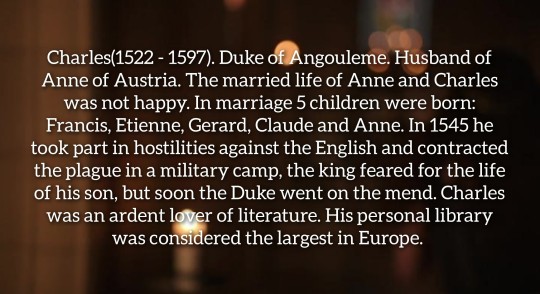

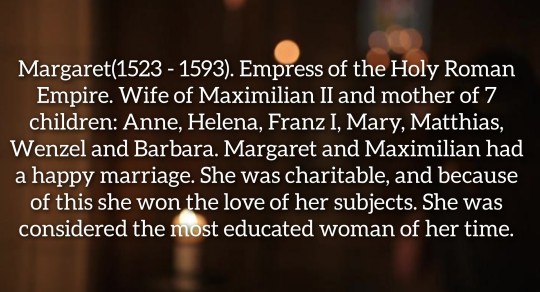
AU: Valois House. Children Francis I and Claude Valois.
Madeleine(1520 - 1583). Queen of Scots. Wife of James V and mother of 9 children: Kenneth IV, Duncan III, Mary, Malcolm, Margaret, Donald, Francis, Claude and Annabel. Madeleine and Jacob's marriage, was a happy one. Was very devout, patronized the church and helped the poor.
Charles(1522 - 1597). Duke of Angouleme. Husband of Anne of Austria. The married life of Anne and Charles was not happy. In marriage 5 children were born: Francis, Etienne, Gerard, Claude and Anne. In 1545 he took part in hostilities against the English and contracted the plague in a military camp, the king feared for the life of his son, but soon the Duke went on the mend. Charles was an ardent lover of literature. His personal library was considered the largest in Europe.
Margaret(1523 - 1593). Empress of the Holy Roman Empire. Wife of Maximilian II and mother of 7 children: Anne, Helena, Franz I, Mary, Matthias, Wenzel and Barbara. Margaret and Maximilian had a happy marriage. She was charitable, and because of this she won the love of her subjects. She was considered the most educated woman of her time
AU: дом Валуа. Дети Франциска I и Клод Валуа.
Мадлен(1520 - 1583). Королева Шотландии. Жена Якова V и мать 9 детей: Кеннет IV, Дункан III, Мария, Малькольм, Маргарита, Дональд, Фрэнсис, Клод и Аннабель. Брак Мадлен и Якова был счастливым. Была очень набожной, покровительствовала церкви и помогала бедным.
Карл(1522 - 1597). Герцог Ангулемский. Муж Анны Австрийской. Супружеская жизнь Анны и Карла была не счастливой. В ��раке родилось 5 детей: Франциск, Этьен, Жерар, Клод и Анна. В 1545 году принимал участие в боевых действиях против англичан и заразился чумой в военном лагере, кароль опасался за жизнь своего сына, но вскоре герцог пошёл на поправку. Карл был ярым любителем литературы. Его личная библиотека считалась самой большой в Европе.
Маргарита(1523 - 1593). Императрица Священной римской империи. Жена Максимилиана II и мать 7 детей: Анна, Хелена, Франц I, Мария, Маттиас, Венцель и Барбара. У Маргариты и Максимилиана был счастливый брак. Была милосердной, благодаря этому и завоевала любовь подданных. Считалась самой образованной женщиной своего времени.
Part 2.
#history#history au#royal family#royalty#au#french#french royal family#france history#france#french royalty#French royal#Royal#Roalty#Roy#French kings#French queens#French king#French queen#15th century#16th century#The reign#the serpent queen#the tudors#henryviii#mary tudor#francis i#Francisii#Henryii#catherine de medici#mary stuart
3 notes
·
View notes
Photo
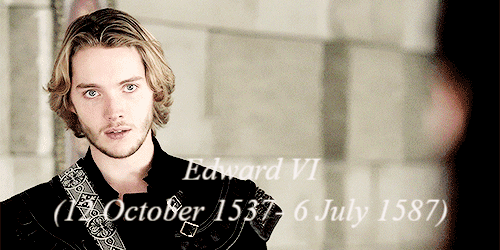


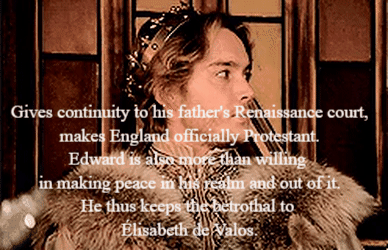
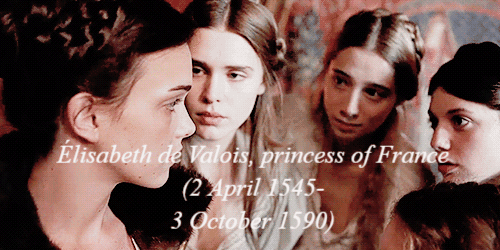
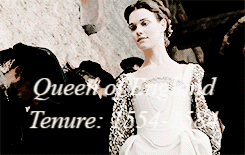
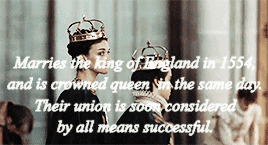
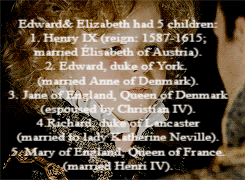
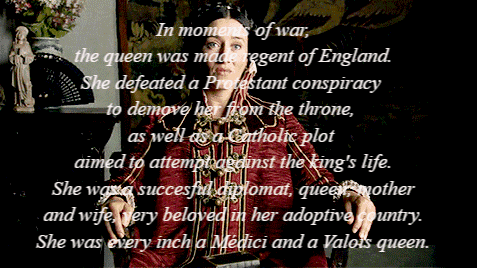
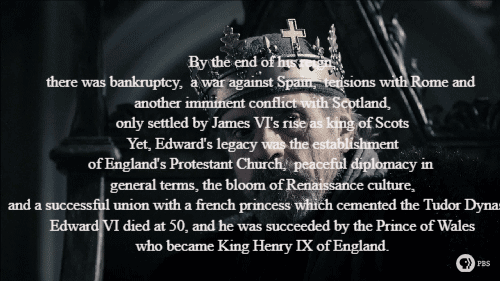
𝐴𝑈: 𝐸𝑑𝑤𝑎𝑟𝑑 𝑉𝐼 𝑚𝑎𝑟𝑟𝑖𝑒𝑠 𝑡𝘩𝑒 𝑓𝑟𝑒𝑛𝑐𝘩 𝑝𝑟𝑖𝑛𝑐𝑒𝑠𝑠, 𝐸́𝑙𝑖𝑠𝑎𝑏𝑒𝑡𝘩 𝑑𝑒 𝑉𝑎𝑙𝑜𝑖𝑠, 𝑎𝑛𝑑 𝑡𝑜𝑔𝑒𝑡𝘩𝑒𝑟 𝑡𝘩𝑒𝑦 𝑐𝑜𝑛𝑑𝑢𝑐𝑡 𝑡𝘩𝑒 𝑟𝑒𝑎𝑙𝑚 𝑡𝑜 𝑎 𝑝𝑒𝑟𝑖𝑜𝑑 𝑜𝑓 𝑝𝑟𝑜𝑠𝑝𝑒𝑟𝑖𝑡𝑦 𝑘��𝑜𝑤𝑛 𝑖𝑛 𝐸𝑛𝑔𝑙𝑎𝑛𝑑 𝑎𝑠 𝑡𝘩𝑒 𝑇𝑢𝑑𝑜𝑟 𝐺𝑜𝑙𝑑𝑒𝑛 𝐴𝑔𝑒... 𝑑𝑒𝑠𝑝𝑖𝑡𝑒 𝐸𝑑𝑤𝑎𝑟𝑑'𝑠 𝑒𝑎𝑟𝑙𝑦 𝑝𝑟𝑜𝑠𝑒𝑐𝑢𝑡𝑖𝑜𝑛 𝑡𝑜 𝑠𝑒𝑡𝑡𝑙𝑒 𝑡𝘩𝑒 𝐶𝑎𝑡𝘩𝑜𝑙𝑖𝑐𝑠' 𝑟𝑒𝑏𝑒𝑙𝑙𝑖𝑜𝑛𝑠. 𝑇𝘩𝑒 𝐶𝑜𝑚𝑚𝑜𝑛 𝐵𝑜𝑜𝑘 𝑃𝑟𝑎𝑦𝑒𝑟 𝑖𝑠 𝑒𝑠𝑡𝑎𝑏𝑙𝑖𝑠𝘩𝑒𝑑 𝑎𝑛𝑑 𝐸𝑛𝑔𝑙𝑎𝑛𝑑 𝑖𝑠 𝑜𝑓𝑓𝑖𝑐𝑖𝑎𝑙𝑙𝑦 𝑝𝑟𝑜𝑡𝑒𝑠𝑡𝑎𝑛𝑡 𝑢𝑛𝑑𝑒𝑟 𝘩𝑖𝑠 𝑟𝑒𝑖𝑔𝑛. 𝑇𝘩𝑒𝑟𝑒 𝑖𝑠, 𝘩𝑜𝑤𝑒𝑣𝑒𝑟, 𝑎𝑡 𝑡𝘩𝑒 𝑒𝑛𝑑 𝑜𝑓 𝘩𝑖𝑠 𝑟𝑒𝑖𝑔𝑛 𝑠𝑖𝑔𝑛𝑠 𝑜𝑓 𝑡𝑦𝑟𝑎𝑛𝑛𝑦 𝑡𝘩𝑎𝑡 𝑟𝑒𝑠𝑒𝑚𝑏𝑙𝑒𝑠 𝑚𝑢𝑐𝘩 𝑜𝑓 𝘩𝑖𝑠 𝑔𝑟𝑎𝑛𝑑𝑓𝑎𝑡𝘩𝑒𝑟 𝑖𝑛 𝘩𝑖𝑠 𝑙𝑎𝑡𝑒 𝑑𝑎𝑦𝑠...
[Camille Rutherford as young queen Elizabeth of England/
Maria Doyle Kennedy as older queen Elizabeth.
Toby Regbo as young King Edward VI.
Jeremy Irons as older King Edward.]
#Tudor dynasty#The Tudors#House of Tudor#Tudor#Edward Tudor#Edward VI of England#Edward VI king of England#Edward VI#King Edward VI#Queen Elizabeth#Élisabeth de Valois#Elisabeth of France#Elisabeth of Valois#House of Valois#House of Valois-Angouleme#Henri II#Catherine de Médici#Henry VIII#Jane Seymour#Historical AU#History#Alternative Universe#history au#tudor edit#camille rutherford#as#queen consort#elizabeth of france#Maria Doyle Kennedy#Toby Regbo
48 notes
·
View notes
Text
Calendar of State Papers Foreign: Edward VI 1547-1553
1551.
Jan. 6. [Antwerp?] Gaeret Harman, goldsmith, to Sir William Cecil. After a good passage he arrived at Antwerp on New-year's day, at 10 p.m. whence he proceeded to Master Channerly [Chamberlain], at Brussels, and delivered the message.
Received for answer that they should have no need thereof, and it was hard to get it, because the Lady Regent is not at Brussels, and that if application were made to the Council for a passport, it might be thought suspicious; therefore bids him make the best shift he can to get a good ship or two as needs require and to get him to Zealand with Master Gondelfings [Kundelfinger] and his company, and with the first wind to sea.
Requests Cecil to procure for him a passport, since without it he may be stayed. Having a bit of the ore in his bag, he gave it to Gondelfings and the Burgomaster, the latter of whom immediately assayed it, and found it so good that there is no doubt if he have ore enough the King shall receive such honest profit as will cause the Council to regret that it has been so long delayed. Has had no tidings of Dansell's coming, or of the money, which grieves him. [Two pages.]
--- Jan. 7. Augsburg. Sir Richard Morysine to Cecil. Were well worthy blame, and unworthy either to receive long or short letters from Cecil, if he did not bid his shortest welcome and give most earnest thanks for them. Master Hales plieth him with precepts, and breeds a desire in him, as much as he can, to please them both.
Ciphering is to him such a pain, as he had rather do any drudgery than fall to it, and yet will he lie no more so open as he has done. Winchester's fault he can no way better amend, than in doing as he did, to be most against him. Well likes Mr. Wotton's wariness, and where he can, does mean to follow it. He does but tell reports for the most part, which is, in his fancy, a good part of his service; as he can seldom come where he may know whether they be true or otherwise.
If he does sometime say his conjecture, so it be thereafter hid under a cipher, his lack of judgment, in guessing otherwise than it is, may more justly be pitied than he shent for saying as he thinks. He had rather seem unwise than unwilling to further as much as he can; and what harm do councillors take, when he has said, which may think as they see cause and do what they best like?
That he is so open, the fault is Fortune's, and many times not his. He sometimes hears news of importance when he has scarce time to write them; if he shall send them, they must go as they may; if he stays them for cipher, they may come thither by other means, and he be shent for leaving his duty undone.
He supposes his letters come into England unseen; if they do not the Emperor is content men shall write the success of rebels as well as his good fortunes. He may be bold to favour that he ought, when W. made at his discourses to set up that he ought to have beaten down. Will follow him but when he is forced; learn to pardon faults, and he will make the fewer.
Cecil will perceive what charges will grow newly to him; if the Emperor goes into Hungary, he must either send home his wife or keep at Argentine [Strasburg]; do which he will, he is half undone. Marvels that his diet money cometh not; if that will not serve with more, is it reason he lacks it?
Prays Cecil will cry upon Mr. Hales to sell his western land; he left commission with him, and writes every post to him for it. He would be able someways to entice some to bring him advertisements. His geldings have hitherto served, he must now seek other shifts.
May no licence be granted to him but licence to want, and few to pity him? "Good Mr. Cecil, let me perceive that you have made my scuse of not writing, and that he hath as well a mind to help me out of this beggary as though I wrote daily. I wish you health, and my lady your wife sick of child."
P.S.—"You must in any wise help Christopher Mount to part of his money; if not to all. I know he wanteth; and, as little plenty as I have, I was driven to pity his needs more than mine own lacks. You shall at once do pleasure to twain." [Three pages.]
--- Jan. 8. [Antwerp?] Gaeret Harman, goldsmith, to Sir William Cecil. Earnestly desires that this money may be paid, as these men heartily desire to serve the King. After the Burgomaster had twice or thrice repeated the assay of the ore, he was as merry as if the King had given him 100 pounds, and said that if he might have ore enough, the whole realm should have cause to thank God for it.
Out of the 100 ounces would be got more than eight ounces of fine silver, and half a hundred of good lead. If Cecil will show this letter to the Council, they will see that he has always spoken the truth in regard to this matter, and it were pity that men of no experience should meddle in it, as they would lose the one half that God had given to them. [One page.]
--- Jan. 18. Greenwich. The Council to Sir John Masone. Acknowledge his letter of the 30th December, and commend his diligence. Desire to be informed what he has done in regard to the lewd French book against the King, and that he may let the French King know that, however anxious they are to be on friendly terms with the Scots, the latter will always provoke a breach of the peace.
Dr. Smith has farthered his own suit by printing at Paris a slanderous book against the Bishop of Canterbury. He has once deceived an Ambassador in Flanders, and by likelihood would deceive another in France; but indeed they know him too well to be deceived by him.
Mr. Chamberlain having lately been denied the service of his religion in Flanders, they have caused the Emperor's Ambassador to procure him liberty on pain of his own restraint here. Wish to know how he is treated in this respect in France. Mr. Pickering's preparations are well advanced, and the time of his departure will shortly be made known. Orders have been issued for the payment of Masone's diets. [Three pages. Copy in Sir J. Masone's LetterBook.] Eod. die.Draft of the preceding. [Four pages.]
--- Jan. 19. Blois. Henry II., King of France, to King Edward VI. In favour of Nicholas Guymonneau, a merchant of Orleans, whose vessel had been captured by the English in 1547, during the time of peace. [Broadside. French. Countersigned by De l'Aubespine.]
--- Jan. 20. Blois. Sir John Masone to the Council. Introducing the merchant of Orleans mentioned in the preceding letter, and urging his suit, the same being much made of by the French King and Court. [One page and a half.] Eod. die.Copy of the preceding in Sir J. Masone's Letter-Book. [One page and a half.]
--- Jan. 20. Augsburg. Sir Richard Morysine to Cecil. Is his land so increased since his coming out, or his substance so unknown, that men do think he may serve the King without his diets? He would he could, not that he cares, "if your intrade lasted no longer mine than I have to serve here."
If all his doings be still misliked, he is able to do no better, is sorry for it, and wishes some wise men might shortly call a fool home. He has written so much, and to so many, that he must have a new matter ere he can write more, and come home to make more friends ere he can write to any more.
Shall he continue at his cares where to have money, how to get his house found? What service can a mind thus distempered think upon? or if he chance to think upon any, how shall he do that he gladliest would? He prays God he come no more home, if he has not in this little while spent a thousand pounds within a fifty or three score.
He does ask yet but his diets, and if Mr. Hales would make as good haste in selling his land as he does in entreating him to it, would spend his own first, and cry for his allowances after. Does think there be that owe him their help. If they be not able to pay presently, he will bear with them; if they be, and will not, they do him a good deal of wrong.
He cannot serve without heart, nor live without money. Can less bear this his infelicity, that he must be where spending is necessary, where he must with unreasonable blushing borrow and still fail his day. Had rather write of other things, but sorrow guideth his heart, and his hand the pen.
God send him once home, and he trusts he shall better indent ere he come forth again. Will stop, and let rage of his race, praying that by some means or other he may be holpen to his due. " And thus in frost, all out of temper, I wish you more than I care for myself, health. Yours in temper and out of temper." [Two pages.]
---- Jan. 22. Blois. Sir John Masone to the Council. Requests passports for one year may be granted to Sir Hugh Campbell, Sheriff of Ayr, his son Matthew, their two wives, and eight servants, to go from and return to France through England; and as Sir Hugh intends to purchase here three or four curtalls, begs that they may be allowed to pass without staying, any restraint to the contrary, if such there be, notwithstanding. [One page.]
--- Jan. 22. Blois. Same to same. Requesting passports for Mr. Hugh Kennedy and Mr. Ringan (Ninian) Cranstoun, two Scottish gentlemen, with seven or eight attendants, their horses and other necessaries, to go to Scotland through England; also that such stoned horses or curtalls as he might desire—one or two being at the most—shall pass without restraint. [One page.]
---- Jan. 23. Blois. Same to same. Apprizes them of the departure of Mons. de Lansac, a native of Guienne and "gentleman for the mouth," who has been sent by the French King as a mediator for peace between England and Scotland. Again refers to the case of the merchant of Orleans mentioned in his letter of the 20th.
The military preparations are supposed to be against the Emperor. "This Court was never so secret, and therefore the harder it is to know any certainty of things but as time shall reveal them."
The Chancellor of France has been recently dismissed, on the ground, as common report goes, that he was too slow for the office; but wise men think there was some other matter.
"This Court is all set upon pastimes, and between Candlemas and Shrovetide shall the marriages go forward with much triumph." [Four pages and a half.]
Eod. dieCopy of the preceding in Sir John Masone's Letter-Book. [Four pages.]
---- Jan. 24. Blois. Sir John Masone to the Council. Requesting letters of safe conduct for Sir James Douglas, of Donnelanerycke (Drumlanrig), with eight or ten servants, returning to Scotland through England, and that the same may be sent by John Douglas, who will wait upon their Lordships for Lord Maxwell's safe conduct. [One page.]
---- Jan. 28 Greenwich. The Council to Sir John Masone. Introducing to him a secret agent, "one that Balneys (Balneaves) the Scot hath committed of trust to be in France," and who will bring to him as much intelligence as the Scots have. They have given him 10l. towards his charge. [Half a page. Noted by Masone to have been written in cipher. Copy in Sir John Masone's Letter-Book.]
--- Jan 29. Greenwich. Same to same. In consequence of intelligence received from France, Scotland, and elsewhere, that the great military preparations by the French are intended against England, they desire him to learn from the French King himself their meaning in these preparations. [One page. Copy in Sir J. Masone's Letter-Book.]
---- Jan. 31. Greenwich. Same to same. Introducing the bearer, Mr. Dudley, who accompanies the Vidame to France, and requesting that the usual attentions and good services may be shown to him. [Half a page. Copy in Sir J. Masone's Letter-Book.]
----
Feb. 3. Augsburg. Sir Richard Morysine to Cecil. Has now in all received three letters from him; as glad of these as sorry that any sent from him should come short. Was in his last letter, as by this is sure Cecil perceives, wonderfully cumbered for lack of money.
At home he had not many that ever he durst open his lips to borrow of them any money; and here he would fain be taken for no beggar, not that he passes so much to be one, as that, being so counted, he shall be less able to do good service.
The rest of his calling be able to lash and lay on, and he, poor soul, must oft lose his night's rest, for that he cannot day it as others do. Thanks him for his friendship and services. If he had heard of his money before, his warm letter, which he sent last of all, had frozen itself to nothing.
"Let my lady, your wife, take heed she writes no Greek, for if she do, Joannes Sturmius is like to see it Mr. Ascham hath already done her errand to him, and, I do believe, you and she shall shortly see their letters in print. I will not, for all my saying, do more than shall stand well with both your pleasures; and yet, lest she chide me for some others' quarrel, it were my best to say I would show her letters to strangers; so I know she would be afraid to chide me.
But, what she will, she can write to few that will give her more thanks for a curst letter than I. And yet, let her take heed, for I can, as you may see by my last, speak apace when I am angry."
His wife sends her commendations to Cecil and his lady, wishing that when the former is at Court without her the latter were here. Is glad Mr. Pickering goeth into France, and hopes he shall easily maintain amity at the Court there. Ωσπερ μεν η ειρηνη τοις ανθρωποις τ'αγαθα παντα τικτει ουτω δε πολλα τα λυπαρα, και κακα εκ του πολεμου γινεται. He means as he writes, and wishes they might for three years war with nobody. [Three pages.]
--- Feb. 7. Florence. Francis Peyto to the Earl of Warwick. Hears nothing farther of the General Council proclaimed at Rome. Some doubt expressed as to its proceeding, as many things may fall before Mayday to let the same. Favours have been offered to him of late, as, with the occasion of their so granting, the inclosure will show; to these his reply is deferred, because they be from Rome removed.
It is such as may both well excuse the not accepting, and also still maintain him in his credit. The Pope gives himself good time in feasts and triumphs which have been made this carnival. He is liberal of his pardons, for in this city be many of his jubilees. He is known altogether to be imperial, and only favourer of that faction. He rather attendeth to enrich his own, than of Cardinals to augment the number; for hitherto there is but one that hath the hat, where many more were hoped.
The Genoese are deceived in their vain hope, for at present Don Diego is there, and doth eftsoons return the labourers to the fortress, with whom it is there now matter of state that will with words gainsay the same. So is the liberty there enlarged! Spaniards keep them under awe, whose number daily increaseth in the country thereabouts, but in the city not yet received.
On the 25th ult. Don Garcia, son to the Viceroy of Naples, and brother to the Duchess here, passed in post this way to Augsburg. He seeks from the Emperor the reversion of Prince Doria's room upon the seas. Hitherto he has only had charge of the Neapolitan galleys, with which he has so well behaved, especially in the late taking of Africa, that he is thought likely to obtain his object; and the rather because of his brother-in-law, the Duke, a man of whose help oftimes the Emperor is served, and maketh good stay in his affairs in Italy.
He is also a Prince of wise and notable government, as by his proceedings daily is declared. It is thought that the Bishop of Rome and the Duke here will shortly raise some men to send to the service of the Emperor in Hungary, where he has recently gained from the Turk a strong fortress, with the death of many that were therein.
P.S. Has just received from Rome a letter of 31st January, copy of which he annexes to the inclosure. Is uncertain what may be the foundation of these conjectures, but will prove if he may learn the same. [One page and a half.] Incloses,
~ Copy letter from Rome of 17th January. Advises him to prevent Henry Stafford, who, at coming home, is likely to do him small pleasure, with a wise letter to some of his friends. He may thank his Lord's Grace and his uncle, who has of late spoken to the former in his behalf, and obtained a promise of effectual recommendation of him to any Prince of Italy, where he thinks he may best be entertained, and like a gentleman, in case he would willingly forsake all that he has in England, and return to Christ's laws.
Writer will communicate his mind more at length in next letter; meanwhile, let him consider which he should prefer of these four, the Duke of Florence, Duke of Urbino, Duke or Cardinal of Mantua, or Don Diego, all of whom are his Lord's entire friends. Were the writer to choose, he would select Urbino, for the quietness of that state, before the rest; he has a singular friend in good estimation both with the Duke and Duchess there to further Peyto in that behalf; but let him do as his heart likes best.
~Letter of 31st January. Of his Lord of Sarum, and the writer's love and affection towards him, he needs never to doubt, for he shall find them always ready to his advancement. By a former letter he might perceive in what state Mr. Thomas Stafford, his Lord's nephew, stands with his Grace, whom writer takes to be of such grace and qualities that perchance the time may come that both he and Peyto may be glad, not only to serve him, but that he ever came into these parts. He is not a little affectionate to Peyto upon his uncle's report and that of the writer; so that Peyto, being little older than he, may be hereafter better able to serve him than the writer, whose good years be almost past. No man living knows what he may come to.
Conjectures more things than may be thought on, and therefore writes this as a warning, that when the time comes, Peyto may say the writer prophesied this long before. Let him in the meanwhile proceed diligently in obtaining virtue, and serve God faithfully, and put not all his confidence and trust in a little plot of land he has at home, which every hour may be taken from him. Has been absent from Rome with his Lord's Grace for 15 days, for which reason he did not write last week. [One page.]
--- Feb. 7. Blois. Sir John Masone to the Council. Had received by Francisco their letter of the 29th January, on Monday, the 2d curt., at 7 p.m. Next morning requested audience, which was deferred for two days on account of the great pastimes invited. Gives an account of the King's and courtiers' tilting, the processions and masks, to which the Ambassadors were invited, and had places prepared for them; and of the grand banquet made by the Cardinal of Lorraine, at which the King himself was steward of the feast and the Constable clerk of the kitchen, "to which also were bade the Ambassadors, to see but not to feed."
He "never saw a more goodly or a richer sight. A man would have thought that all the jewels in Christendom had been assembled together, so gorgeously were the dames beset with great numbers of them, both their heads and bodies."
On Friday had audience of the King after dinner. Details at much length their conversation, and a subsequent one with the Constable, in both of which the most positive assurances of friendship and disclaimer of any hostile intentions were given. The general belief is, that the preparations are designed against the Emperor, whose Ambassador "standeth in such doubt, as he hath already sent away his wife."
Divers bands have been sent lately to Piedmont and some into Burgundy; and the Emperor, on the other side, makes himself strong in both places. The preparations made of soldiers are most in Gascoigne and Burgundy. The Swiss are, by all means, entertained, and so are all such states of Italy as these men make any account of.
The strife between the Bishop of Rome and the King for the archbishopric of Marseilles is ended, and the Bishop for this time hath his mind. The harangue against the English made at Court was by the prothonotary Monluc, in presence of the King, the Queen of Scots, the Cardinal of Lorraine, and Mons. de Guise, assembled to discuss the pacification of matters in Scotland. "It should seem he brast out therewith ex abundantia cordis, and of his cankered malice towards us."
Had brought the matter of the lewd book before the Council; states what occurred on the occasion. Has discovered that the author is Peter Hogue, "who hath long served in all practices between the subjects and the Prince against whom this King hath meant hostility. He was first Secretary to Rincon, and sithen to Poulin, and lastly he was joined with Monluc in Scotland and Ireland, and was at the commotion time in habit dissembled in England. But, finally being sent to the Emperer's countries to make some stir there, he is taken, and lieth by the feet in Riplemonde, like to have that that he hath long sithen deserved."
This Peter wrote the book, but as far as he can learn it was published by the said malicious Monluc, who is now in Gascony, and to whom they have promised shortly to speak withal. Concerning the service of his religion, he has ever since his coming to the Court, used on the holidays, for the most part, the communion, and some time in the working days the common prayers, which he causes to be done in the open place where he dines and sups, and at such an hour as the end thereof, for the most part, meets with the beginning of his dinner, and hitherto never found any man fault therewith, and yet have a good number at Sunday times come to the God-speed of it, as well Frenchmen as Scots.
Is informed that certain rovers have gone from these quarters to lie about the coast of Devonshire and Cornwall, among which, besides Scots and French, are many Englishmen. The blind Scot, that nameth himself Archbishop of Armachan [Armagh], passed by this Court five or six days ago, and was very much made of; he has gone in post to Rome, being appointed to be one of the doers in the Council.
Captain Poulin is restored to liberty. Chastillon is now in great credit. His heart is made to bleed by hearing the base sort of the Court, both Scots and French, who are glad to hear anything to the disadvantage of the English doctrine, talk of the buying and selling of offices in England, the decaying of grammar schools and the Universities, with many other enormities, which they show one to another, printed in English books, and set forth by English preachers.
Rolfe has come in his old age to be a student in Orleans. The Portuguese Ambassador, having a suit in England for certain plate and other things spoiled upon the sea, has requested him to write to their Lordships for favourable justice. He is a right honest man, therefore it were a good deed if he might be restored to some part of what he has lost. Desires to know what answer he shall give to the Earl of Huntly, who often sends to him touching his passport. [Eleven pages.]Eod. die.Copy of the preceding in Sir John Masone's Letter-Book. [Eleven pages and a half.]
----
Feb. 16. Westminster. The Council to Sir John Masone. Acquaint him with the proceedings at their conferences with Mons. de Lansac on the subjects of his mission, viz., the settling of differences between them and the Scots as to boundaries, the ransom of prisoners, free traffic on sea and land between the English and Scots, &c.
The main propositions had been agreed to, and what remained are to be arranged by Masone and Sir William Pickering, who is shortly to be sent to France on a special mission. The Bishop of Winchester was yesterday deprived of his bishopric, "and in his disobedience and obstinate refusing of the King's Majesty's mercy and favour, showed not only a wilful pride, but also a cankered heart of an evil subject." [Six pages. Draft.]
Eod. die.Contemporary copy of the preceding. [Six pages.] Eod. die.Copy of the preceding in Sir John Masone's Letter-Book, with copy of the articles delivered by Mons. de Lansac, and extract from a treaty between Edward IV. and James III. of Scotland, referred to in the letter, and which are not in the drafts. [Nine pages.]
---- Feb. 17. Westminster. Same to same. Sir William Pickering has departed with a joint commission for Masone and himself, as mentioned in their former letter; think that as Masone has more readiness in the French tongue, that he should take upon him the handling of the arguments contained in the instructions sent in their last.
On the same day that Lansac had received his answer, news arrived from the Captain of Berwick and Sir Robert Bowes that the Governor was at Edinburgh with all the French troops in Scotland and the complement of five or six Scottish ships, for the purpose, as was reported, of going to the borders to punish certain thieves in Liddesdale, but in reality, as the Captain of Berwick was informed, to make a sudden attack upon that town.
Of this they had apprized Lansac and the French Ambassador, who were immediately to despatch a messenger to Scotland to prevent hostilities. [Three pages and a half. Draft.] Eod. die.Copy of the preceding in Sir John Masone's Letter-Book. [Two pages and a half.]
--- Feb. 18. [Westminster.] Instructions from the King and Council to Sir John Masone and Sir William Pickering, sent to the French King for the purpose of settling the mission of Mons. Lansac by an amicable arrangement of all the differences between England and Scotland. [Eighteen pages. Draft.] Eod. die.Copy of the preceding in Sir John Masone's Letter-Book. [Eight pages.]
----
Feb. 23. Blois. Sir John Masone to the Council. Three or four days since was informed by a wise man and of practice, whom the French King uses often in his secret affairs in Germany, that notwithstanding all their fair words and specious appearance, the King and Court are bent upon war with England, and assuredly will if the Turk comes into Hungary.
That this is prompted by Mons. de Guise and his house, in so much as it is already half concluded to send away the Queen of Scots with all convenient speed, and with her 300 or 400 men of arms, and 10,000 foot. His informant is much affected to the English religion, and having a great desire to go to England to see Bucer, may probably accompany Masone on his return, when their Lordships may learn more.
Endeavouring subsequently to ascertain what ground there was for such assertions, had learned that lately the King was highly irritated by a letter from Lord Maxwell complaining of the refusal of his safe conduct; which feeling has been fomented by the Queen of Scots and her house, who bear in this Court the whole swing.
"The Scottish Queen desireth as much our subversion, if it lay in her power, as she desireth the preservation of herself, whose service in Scotland is so highly taken here, as she is in this Court made a goddess. Mons. de Guise and M. d'Aumale, and the Cardinal of Lorraine, partly at her egging, and partly upon an ambitious desire to make their house great, be no hindrance of her malicious desire."
The Constable, he thinks, would be content things proceeded otherwise. Recommends vigilance; Fistula dulce canit volucrem dum decipit auceps.
"The credit of the house of Guise in this Court passeth all others. For albeit the Constable hath the outward adminstration of all things, being for that service such a man as hard it were to find the like, yet have they as much credit as he with whom he is constrained to sail, and many times to take that course that he liketh never a whit."
Francisco has arrived with their Lordships' letter announcing their intention to send Pickering: as it may be sometime before they can have speech with the King, who is abroad hunting, and will not be within eight miles of the town for five or six days, sends back Francisco, who will inform them of the precarious state of his health, which compels him for the most part to keep his bed.
In case it shall please God in the mean season either to call for him, or to continue him in this weakness, their Lordships shall not do amiss to give Pickering commission to do the errand alone, wherein peradventure he will otherwise be scrupulous. The malapert glory of the Bishop of Winchester that was is in no place better known than in this Court. This day a great many Scottish gentlemen were despatched with commission to take shipping in Flanders. [Six pages. Indorsed by Cecil.] Eod. die.Copy of the preceding in Sir John Masone's Letter-Book. [Six pages and a half.]
---- Feb. 24. Augsburg. Sir Richard Morysine to Cecil. What should he look for Cecil's long letters, when the shortest be so comfortable to him? It is his comfort that all his doings do not displease. His trust is his time weareth fast away, and that some good chance or other will send him home. If ever he comes home again, and may do anything with those that do send him abroad, he thinks he can say so much for poor men tarrying at home, that he shall be the last that shall be sent with any great Court to shame himself.
His continual fear to lack, or rather his own continual lacks, must needs grieve him, and yet do they not half as much as that he is forced still to weary the Lords with his beggarly complaints. He thinks they would reckon him worthy some help, if they knew how his things waste away.
He could write of his beggary till to-morrow, and find matter plenty. If he goes to anything else, now the Lords' letters are done and he almost tired, Cecil sees œgri hominis somnia how they hang together. Makes suit that some clerk of the Council might write but this much to men that serve abroad, "your letters written such or such a day are received," &c.
If Cecil were in this case, he would think it as necessary as anything can be. Unquietness beareth such a rule in men's heads, while they may doubt whether things come as they be sent or no, that he shall do nothing wisely that feeleth that trouble, if he be no wiser than the writer is. Cecil sees he is troubled, therefore will no longer trouble Cecil. [Two pages.]
----
Feb. 25. List of despatches sent this day to Sir John Masone and Sir William Pickering, viz.:— 1. Credentials for Sir William Pickering as Ambassador. 2. Instructions for Sir William Pickering. 3. Letter of revocation of Sir John Masone. 4. Letters from the Council to Sir John Masone. 5. Letters to Sir William Pickering to send Thomas Dannett. [Half a page. Indorsed by Cecil.]
--- Feb. 25. Westminster.298. Letter from King Edward VI. to Sir John Masone. Revoking his appointment as Ambassador, and notifying that of Sir William Pickering as his successor in office. [One page. Copy in Sir J. Masone's Letter-Book.]
----
March 17. Blois. Henry II., King of France, to King Edward VI. Acknowledging receipt of his letter by Sir William Pickering, and his concession of such points as had been urged by Lansac; for the completing of what remains will shortly despatch a gentleman who will pass through England to Scotland. [Countersigned by Bochetel. One page. French.]
---- March 17. Blois. Sir John Masone to Cecil. Requests that there may be no delays in the business of Sir William Pickering, who has promised to return within 18 or 20 days. "These men sithen this last commission seem much altered in disposition towards us, and in all men's opinions we are like this year as the last to be friends. If they mean otherwise, they be devils and no men." The Master of Erskine, whom he takes to be a very honest man, and given to peace and unity, will, with M. de Lansac, within two days be in England. [One page.]
---
March 20. Blois. Sir John Masone to the Council. Requesting a safe conduct for the Archbishop of Glasgow and his retinue, desiring to go to and return from Scotland through England. [Half a page.]
--- March 21. Blois. Henry II., King of France, to King Edward VI. Re-credentials of the Sieur de Lansac, sent to England on the matters contained in the letter brought by Sir William Pickering [Countersigned by Bochetel. One page. French.]
--- March 23. Augsburg. Sir Richard Morysine to Cecil. Perceives by Mr. Hales that his ciphering now doth as much cumber Cecil as his lying too open at the first gave occasion for warning him to play closer. Sees that in vitium ducit culpœ fuga si caret arte, and will from henceforth mean to hit the mean. Were Cecil in his place, believes that he would send few of those things open-faced that are now covered with cipher.
Mr. Hales says he is too merry. He must answer and say they be morosiores quam quibus morem gerere vel queat vel velit, that cannot allow him more mirth than he at any times hitherto has used.
Mr. Hales writes that he has spoken to Cecil to help that the Lords may license him to have his diets in leather. "If you think I could be content to put you in silk, see that you help to clad me in leather." It is a mean spur to service to be always wanting; but he dares not touch this string, it maketh him all day after out of temper. [Three pages.]
--- March 23. Blois. Sir John Masone to the Council. Although the Master of Erskine and M. de Lansac were to have left last Thursday, they had been detained until this present Tuesday, "the occasion whereof is the far lying of the Chancellor from the Court, without whom, albeit he be removed from the seal, they conclude no great matter here; so much do they esteem a wise and a faithful servant, notwithstanding some displeasure taken with him upon a private matter.
The Master of Erskine seems to be of a plainer sort than many are of that country, and to mean very much the sincere reconciliation of the two nations together. M. de Lansac has everywhere made honourable report of their Lordships' courteous handling of him. M. d'Estrees has returned, but the vessel mentioned in his letter of the 18th has been stayed.
The Rhinegrave has returned from Denmark to a house of his wife in Gascony, albeit he was in sundry places by the way narrowly laid for. The Turk prepares 200 galleys for the recovery of Africa, to the great fear of all the coast of Italy, Sicily, and the islands in the Mediterranean. Much practice of late to make Parma hold of the French King in like manner as the state of Mirandola, and M. de Thermes, under pretence of going to Rome as Ambassador, has been some time there for that purpose, to the concluding whereof M. St. Pierre has very lately been despatched hence in post.
The Bishop of Rome winks at this, and thereby has provoked the choler of the Emperor, who cannot but must much storm thereat, since it will give the French King a hold to do great harm in Italy when he pleases.
There has been a great skirmish between Don Fernando and Signor Octavio touching the question of the frontiers of Parma and Piacenza, wherein many men are miscarried; and news have been received that Signor Octavio has beaten down all the Emperor's arms and crosses, and planted in their places the arms of France.
Recommends the case of the French merchant at Dover, as one very evident, even by the deposi tions of the inhabitants of Dover, and demanding speedy justice. Begs them to hasten the return of Pickering. [Three pages. Partly in cipher, deciphered.]
----
March 30. Cleves. William Duke of Cleves, to King Edward VI. Letters of credence in favour of Herman Cruser, Doctor of Laws, who visits England on business of the Duke's sister. [One page.]
----
April 7. Augsburg. Sir Richard Morysine to the Council. Hearing that the Lady Regent meant to make towards Flanders to-day, had on Saturday last requested an audience, which was granted the next morning at nine o'clock. Her Grace's professions of friendship on part of the Emperor and herself were great. Had told her that the news of this Court, which are that three French ships should be going into Ireland and drowned by the way, made him afraid the English should have good need of powder ere they should have leave to fetch it out of Flanders, if her Grace did not both help him to speak, and after help to speed such as should be appointed to fetch it.
That the Emperor had given him a very gentle answer, showing a desire to furnish as much as could be conveniently spared; yet he saw the suit would finally be committed to her Grace's order, and therefore prayed her as her plenty might serve their need to help them.
He had very good words, "if there were to spare, and we should have occasion to spend powder, we should," &c.; but his prayer is and shall be that there may be no more need of powder than they have will to afford it, and then it must either be wanted or fought hard for before it is had, or shortly after. M. D'Arras had been at Council with her Grace a great while before he came.
Whatsoever the matter was, he saw by her countenance she was in dumps, although, smiling twice or thrice, she did what she could to keep cares in the dark. Here be more posting and little audience given to foreign matters. The Bishop of Jaen, as yet, has not spoken with the Emperor since his coming. Pigghinus would fain take his leave.
The King of Sweden's men hitherto cannot get to his Majesty. The King of Poland's Ambassador has been there these two months upon taking his leave; he abideth his good hour. It is said that the Queen of Poland is either stark dead or not like to live, and that France will practise with him for a marriage. Has waited upon two Polish gentlemen that came to see the Lady Elizabeth's Grace.
Knows that they both went home great praisers of her person and of her bringing up. The Frenchmen that were here have gone, as their Ambassador told Bernardine, towards Vienna. Cannot imagine why they should travel that way, unless it be that France may give from thence better advices to the Turk.
Rumours here that France meaneth a voyage into Ireland. Letters from their Ambassador at the Turk's Court had arrived at Venice late at night. In the morning they called a Council, and forthwith despatched 600 new soldiers to Corfu, with money and victuals for themselves and those already there.
The Turk is said to have at Vallona, hard against Italy, 200 vessels to ship over horses, every vessel able well to carry little lack of 40 horses. To-day, Signor Gastaldo, who was Master of the Emperor's camp in his wars of Germany, goes towards Vienna. Some Spaniards lately slain by the Turks. Africa not thought to be the mark the Turk shooteth at. Italy and Sicily never fitter to be assaulted, both being so weary of the Spaniards that they care not who comes, so they may trudge away. Great dearth of corn and victuals in both.
The General Council, it is said, will be prorogued to September; because of inconvenience to those that are called and are now on their way to it, supposes they will counterfeit a beginning, but there be few likelihoods that it should last any while. Germany is unquiet, and like to wax madder now that cold and snow have almost left. Two of these French gentlemen that came hither of late did communicate at the Protestants' church under both kinds.
Duke of Oldenburg is said to have entered into Magdeburg with 300 men well horsed and well hearted. Will know more of the matters of that town by copy of a letter received from thence sent herewith (missing). Since then news have come that on the 25th March the inhabitants had given Duke Maurice's men another great overthrow, and taken prisoner his chief captain, Peter Pfefferkorn, with 200 more, whom, after disarming, they drove altogether before them into the town.
Mutual complaints of the Emperor's Council and Duke Maurice; the former thinking that the Duke might have done more than he hath, and the latter that he was promised better aid than hath been sent to him. Men mutter that the Duke will procure himself no longer the hatred of Germany by farther offering displeasure to these men.
The three Bishops-Electors and the Palsgrave, who have been always confederated, are, as it is said, together; some think for the Coadjutoria, others because the Emperor has taken into his hands Superiorem Palatinum, and the decease of this man doth make a claim ad Inferiorem. The Court will be but meanly furnished now King Maximilian has gone, the Queen going, and the Electors and Princes have left. The Prince of Spain is also ready to depart.
The Emperor has here a guard of 2,000 foot, and it is said intends to bring 1,500 cavalry into the town; if so, the horses there, that now can hardly get meat, must starve, or seek victuals in other places, there being no hay within a dozen English miles round about. People supposed his Majesty would have removed hence, because wine and all kinds of victuals wax not only unreasonable for their price, but not to be had for their scarceness; yet now it is thought they shall lie here most part of the summer.
Physicians think it perilous for his Majesty to remove till his health is stronger. Knows not whether it were better to be at the expense of removing where things may be had cheaper, or to remain here, dearth notwithstanding. Trusts their Lordships will devise, or rather have devised already, some help for him. [Four pages. A few lines in cipher, deciphered.]
---- April 10. Draft instructions by King Edward VI., with the advice of his Council, to Dr. Wotton, Dean of Canterbury and York, sent to the Emperor as Ambassador. He is to explain that no offence was intended by his Majesty, and if any discontent has been caused by the over-earnest speaking of religion to M. D'Arras or the Emperor by the Ambassador now revoked, it is to be ascribed to the excessive zeal of the man.
That his Majesty, on grounds of natural equity, expects that his Ambassador in Flanders shall have the same free exercise of his religion in Flanders as the Emperor's has in England. And in regard to the Lady Mary, that no promise of the exercise of religion had ever been made; that a prescribed form of common prayer has been established by Parliament, and that as a subject she is bound, as well as his Majesty, thereby, so should he not but do unjustly to violate it, or in any point to agree to the breaking of it. [Ten pages.]Two copies of the above, with slight variations, attached.
--- April. 11. [Greenwich.] Instructions by the King and Council to Sir William Pickering, sent to France to notify to the French King the appointment of the Bishop of Lichfield and Coventry [Richard Sampson], Sir Robert Bowes, Sir Leonard Beckwith, and Sir Thomas Chaloner as Commissioners to meet with those of France, for settling the boundaries of Scotland and England, about the beginning of May next, and to commence his duties as Ambassador on the departure of Sir John Masone. [Draft. Seven pages.]
-----
April 14. Augsburg. Sir Richard Morysine to the Council. So long as he hears not from their Lordships, he will pay no attention to the rumours that come abroad. And yet when it is reported that the French King meaneth to be busy in Ireland, and his Ambassador here says it is most false, he might both answer others, if he knew the state of matters at home, and believe the Ambassador as he should see cause.
It is said to be very certain that the French King has 28 galleys at Marseilles, and has lately sent thither 140,000 crowns to do such things withal as are in hand; there is also much making of biscuits and such like provision. Further, that a Turkish galiot has arrived there, to solicit the French King to be in readiness, that both their forces may be abroad at the same time.
The Emperor has also new ships and galleys at Barcelona. The Prince of Spain's departure is delayed, either because the French galleys may cumber his passage or because Andrew Doria has not yet returned from the succouring of Africa. Some say he means to seek out Dragut Rey, in hope to find him in certain straits where he must either fight or yield. Heard this day that Doria is very sick, and some think that by this time he is stark dead. Was told yesterday that letters from Venice mention the capture of a castle of the Duke of Ferrara by Ferrante Gonzaga; but heard to-day that it is a castle belonging to Parma, called Brusa. Whether it be the one or the other, it is thought that war will follow.
Yesterday came from the Bishop of Rome one Dandino, a bishop, to commune with the Emperor in matters of Parma; so that the Bishop has three bishops here, who severally practise with M. D'Arras. Dandino, having risen by the house of Farnese, is like to favour Duke Octavio's desires, being thought to be full Farnese, as the Bishop of Jaen is thought to be Imperial; but both, notwithstanding, use all their friendship to the service of a third.
Some reckon that the Bishop of Rome, either to dash the Council or for some other reason, so mindeth to cause a jar between the two Princes, that he will give to the Emperor all the interest that Rome has in Parma, and suffer him after to deal with France for the recovery of it as best he can. Carolo Vic [Carlowicius], agent here for Duke Maurice, was sent four days ago to his master by the Emperor, with instructions, it is supposed, to agree those of Magdeburg, finding less hope now to do them harm than at the beginning.
Their Lordships must take all these things as reports, and not as of his own certain knowledge. Hears that an old fellow with a long beard has gone from this Court to serve the Lady Mary; he was a good while servant to Chapuis, and after that to Dilphius, and he has letters, to whom Morysine wots not, from the French Ambassador, which he wrote with leisure and very diligently.
Three days since the Admiral of Flanders wrote hither that the French King's naval preparations are great, and thought it convenient the Emperor should have a good eye to his doings. To-day or to-morrow the Emperor entereth into the Diet, and it is thought will not tarry in it past 10 or 12 days: if he means to accord with Magdeburg and Bremen, as some suppose, it is like enough other things are in hand.
All men think certainly that war will be proclaimed ere May be quite expired. Pigghinus has taken leave of the Emperor, and goes, they say, to the Council. The Emperor has again written to all his, that they fail not to be at Trent on the day appointed. Thinks that the more show there is of a Council, the less it is meant; and that the Emperor's taking of guaiacum and writing of new letters is but to make men imagine that he thinks of nothing but of the Council; for if the Council were certainly meant, the first letters from the Emperor would serve well enough to command as many of his subjects as must and mean to obey.
Yesterday heard that the Bishop of Rome has imprisoned two Bishops in the Castle of St. Angelo, because they have become Protestants: one of these is the Bishop of Bergamo, a Venetian of good house; the other's name he knows not. Paulus Vergerius has set them a goodly example; if these be come, more may follow. Vergerius has done a marvellous deal of good by leaving his bishopric and forsaking his hope of growing great in the world; but he has done much more good by printing daily of new books, which go in great numbers into Italy. Many of these are dedicated to the King's Majesty.
The man has left all to follow Christ, and lives very hardly. Many there are can gladlier commend well doing, than provide that virtue go not a-begging. "Bucer's death has raised up again the bruit that was here, that we are become Jews. The tale is thus told: the King's Majesty asking Bucer how the Bishop of Rome's authority might be quite extinct? His answer was, 'Sir, Messias is not yet come, and therefore the authority that Christ hath given him is to be accounted as none.'"
Their Lordships see what lust they have to lie, that lie thus, not so much as colouring it with some likelihood of truth. "Bucer is safely laid up, and our country not the worse of a mite that they, which know no more of Christ than his name and dwelling-place, do take us all for damned souls." Many Spaniards and Italians this Lent past went to the Bishop of Rome's Nuncio to be absolved, for that they had served in the wars the King of England.
Yesterday saw a letter from Ferdinando's Court that as yet little harm has been done on either part, but the Bassa of Buda has gathered a great power, rather to defend himself than annoy others, although some think he waits a larger force from Adrianople and Belgrade, and then, on all sides at once, to set upon Transylvania. Sends herewith a letter from Wittenberg to an honest man of this town, containing the matters which have been done at Magdeburg during the last month. [Four pages.] Incloses,
319. I. From Wittenberg, 23d March. Here they are building boats for making a bridge across the Elbe. They make frequent sallies, and beyond all expectation defeat Maurice's troops. They intercept ammunition and provisions and convey them into the city. So vigorously do they fight, that two days ago heavy firing was heard about 12 miles from this, and is still occasionally.
All say that it is quite impossible they can take the city. The day before these letters were written many country people came to Wittenberg severely wounded, who said that they had saved their lives by concealing themselves behind the dead bodies.
When Maurice's troops surrounded the gate to prevent issue from the city, these countrymen were told to leave or abide the consequences. While they delayed 2,000 soldiers rushed out of the city, slew about 300 of them, and attacking a large number of troops who were defending the trenches, killed some, dispersed others, captured several together with a standard, and took them to the city.
These on the same night they dismissed, with white rods in their hands, after disarming them and writing down their names. John Margrave of Custrin desired to reconcile them to Maurice, and a convention was held at Corbet, but without results. [One page.]
----
April 18. Amboise. Sir John Masone to the Council. George Paris, the Irish agent, mentioned in previous letters, has arrived, in company with a great gentleman from Ireland, offering the service of the rebels, with their country, to the French King, if he will send troops thither.
They have had very good countenance both of the King and of the Constable, and have been in communication with the Bishop of Rome's Ambassador; but it is understood that they have been informed they may look for no aid hence. Details the political intrigues and differences among the Scots at the Court. The Emperor is exceedingly displeased with the Pope, whom he believes to have been a worker in the affair of Parma; and it seems that he has no fancy to be doing with the French King, by whom he has been so pricked lately, as, if he had any mind thereunto, he could not have kept his patience.
Rumours that the Emperor mindeth to have war with the English. The Scottish Queen's shipping is hasted very much, and it is supposed that she will embark a month sooner than was determined. General musters through France. No great haste making there for sending to the General Council. The reports as to the Turk's intentions against Africa are dying away.
The frontier of France upon Spain is very straitly kept. The King of Navarre has been dangerously ill, but is recovering. Lady Fleming departed hence with child by the French King, and it is thought that upon the arrival of the Queen Dowager in Scotland she shall come again to fetch another. States his objections to corporations. Complains of the long absence of Pickering, of his continued feeble health, want of money, and relative discomforts and inconveniences. [Nine pages and a half.]Eod. die.Copy of the above in Sir John Masone's Letter-Book. [Nine pages. Printed by Tytler, Vol. i., p. 351.]
---- April 19. Brussels. Sir Thomas Chamberlain to same. A Secretary of this Court, named Matthew Strick, leaves in four or five days for Scotland, in the capacity of Ambassador resident there, and a like Ambassador from Scotland is expected. Bremen and Hamburg are reported to have agreed with the Emperor, but Magdeburg still holds out. Great warlike preparations are made in Spain, and all the merchant-vessels are pressed into service: their destination is not known, but is supposed to be for another voyage to Algiers. [One page.]
----- April 20. Greenwich. The Council to Sir John Masone. Sir William Pickering has been detained by them until the Scottish matter should be farther proceeded in. He now leaves, and they request he may be thoroughly instructed by Masone before he enters upon his official duties. [Half a page. Copy.]
----
April 22. Amboise. Sir John Masone to the Council. The name of the person who came with George Paris is Cormac O'Connor, the eldest, as he says, of nine brothers all alive; and he states that his father is the great worker of all this rebellion, and could never be induced to submit, notwithstanding the general coming in of the rest of the Irish nobility, in the time of King Henry VIII., although he has one house within a stone's cast of the English pale, and another within 20 miles of it.
He charges the French King's messengers with causing the whole stir, and has requested from the Constable an aid of 5,000 men, which, with their own force, would suffice not only for defence but for offence. He has been put off with fair words, and is likely to receive nothing else; but the Queen Dowager of Scotland and the Vidame would fain have them helped. The Scots here are much discontented, and mislike the yoke that foolishly they have put their heads in. Mr. Dudley and Mr. Stukeley, who have been made very much of, return to England in seven or eight days.
Schertel, the Protestant captain of Augsburg, despairing of pardon from the Emperor, has within these three days come to the Court and having offered his service to the French King, is very well entertained for the first coming. Hears nothing of Pickering, whose tarrying he can only impute to his own ill-luck.
To-day news have arrived that the Queen of Bohemia has been brought to bed of a son, and that both her husband and the Prince of Spain were departing for Spain, the one to see his wife, and the other to keep the ordinary Courts held every fourth year in Castile, Aragon, and Catalonia, to the great advantage of the King. [Two pages and a half.]Eod. dieCopy of the preceding in Sir J. Masone's Letter-Book. [Two pages and a half.]
---- April 27. Amboise. Sir John Masone to the Council. The Irishmen mentioned in his last letter were on Friday willed to keep their lodgings, and to resort no more to the Court until they should be sent for. Supposes they will be despatched away very secretly, or that the object of their mission being so clearly known, it is not deemed expedient to entertain them so openly.
The departure of the Scottish Queen is deferred again; some think because of a fancy that the French King has for one of her train; Mr. Dudley has behaved himself in this Court very honestly, and has communicated to Masone all that he could learn by haunting the company of the Vidame, than whom a more superstitious man is not in all this realm, and who has done all in his power to have the Irishmen aided.
Longs to hear from England, having had no tidings from thence since the 26th of February. Begs to be informed if there is any alteration touching Pickering, in order that he may provide for such things as are necessary for his office, whereof, by too much trust, he is at this present so destitute as never was there in any Court a more miserable Ambassador.
Yesterday arrived a Danish nobleman, called the Count D'Igles, who was brought up at this Court, and has come, as he alleges, to christen a son of Marshal St. André. A post from the Commissioners on the frontiers of Scotland has just arrived by sea, and two days ago the Baron de Courton was despatched thither. [One page and a half.]Eod. die.Copy of the preceding in Sir J. Masone's Letter-Book. [One page.]
----
April 28. Amboise. Henry II., King of France, to King Edward VI. Has instructed his Ambassador, the Sieur de Chemault, to request that his Majesty will cause to be delivered up to him a Scotsman, named Stuard, implicated in a conspiracy against his grand-daughter the Queen of Scotland. [French. One page.]
---- April 28. Augsburg. Sir Richard Morysine to Cecil. Though Germany cannot match England in sweet herbs, it can in nettles and such as have skill in stinging. He is a proof who wrote to the Council that Morysine was a messenger (αποστολος) rather than an Ambassador (πρεσβυς). Will not regard John Hales' complaints. Knows who says, it is strange if we can endure the cauteries of the physician, and not advice administered when we do wrong. Begs he will stand his friend, as he did by his attorney, when J. H. was there.
Knows the thanks that good advice deserves. Gives a quotation in Greek to this effect, and adds, "My Lady Cecil can easily spy my theft, and so see what I might a-stolen more. I must say my Lady Cecil, and not change an opinion so imprest in me." Must stick to his opinions in that Court like his grandfather. "Knight it you when you can, I may no more unknight you than I can unlady my wife, and yet her ladyship on working-days is very well content to be wrapped in English clothes, and like shortly to mourn for silk if leather make me not able to barat with some shifting mercer."
Thanks him for leather, as he expects to be baited when Wotton comes. Will be able to cast off the dog let loose upon him, if it be not the mastiff himself. Is sorry that Cecil would have him speak French, which he hardly understands; "Dieu vous garde, Mr. Buttes was wont to add, de bon jour." The French Ambassador has many advices that the two heads will not easily be reconciled. Cecil must induce him, for whose safety they are both most anxious, to yield a little of his state if the other cannot stoop.
Their chief object must be the security of the King and kingdom. Considers he is writing not only to Cecil, but to the Duke of Somerset. Cecil's lady must kneel for him, and pay his compliments to the Duchess. "In earnest, if I have no leather my men will go barefooted." Has written to Northampton and Warwick, in whom is all his trust. [Three pages. Holograph, partly in Greek, partly English in Greek characters.]
---- April 29. Amboise. Sir John Masone to the Council. A conspiracy to poison the young Queen of Scots has been detected. He that took the matter upon him is an archer of the guard, who has escaped into Ireland. Much search is made for him, and it is reported that he has been already stayed to be sent into Scotland, and so again into France.
The old Queen is fallen suddenly sick upon the opening of these news unto her. The design is supposed to have been devised by some miscontented Scots. The same post that brought these tidings also brought word that the Lady Fleming is brought a-bed of a man child, whereat the women here do not much rejoice.
On Monday a French post arrived from England, and since then there has been much talking of dissensions among certain of the English nobility. These he deplores, and thinks that the Ambassador ought to be informed of the truth of occurrents at home so as to stop such rumours: as for himself, these 10 weeks he is more ignorant of any occurrents of England than is the worst pack of this Court.
Is in continual hope of the return of Pickering. The Princess of Navarre is with child, to the great rejoicing of the whole house of Vendôme. The King of Navarre has settled 400 francs per ann. on the bearer who brought the news from his daughter, and on his heirs for ever.
The Duke of Vendôme is still with his father-in-law, not far from the frontiers; and it is thought that if the Emperor is not encumbered with the Turk, there shall be some exploit attempted for the recovery of Navarre. Has not heard from his doers in England touching the receipts of his diets, and beseeches their Lordships' aid herein.
He has lived on credit these two months, not without great interest, and as all his plate and moveables have been sent off, he has no help for himself on this side. His diets are not much more than 37 shillings a day, which only defray his horses and house rent. [Two pages.] Eod. die.Copy of the preceding in Sir J. Masone's Letter-Book. [Two pages.]
--- April 30. Venice. Peter Vannes to the Council. Takes advantage of the departure of a courier extraordinary to inform them that the Turk's preparations are daily more and more certified to be great, and besides the 109 galleys which he has ready, he is providing 40 or 50 more.
The doings of Andrew Doria are very prosperous to the Emperor's affairs, as will be seen by the inclosure communicated to him by the Emperor's Ambassador. The Bishop of Rome's demonstrations against Parma are like to turn into a calm, as it is reported that the Emperor is unwilling to kindle a war in Italy, and the Bishop of Rome is unable of himself to take any such enterprise in hand.
The Venetians are very busy, and in eight or ten days their general with the galleys shall set forth. The Prince of Spain, it is said, defers his journey to Spain until the return of Andrew Doria. This day Signor Daniel Barbaro has had his first audience of the Seigniory, and is understood to have reported very honourably of the King's Majesty and their Lordships. [One page and a half.] Inclosure.
----
May 1. Greenwich. Same to same. Informing him that on last St. George's day the French King had been elected a Knight of the Garter, and that on the 18th of the present month the Marquis of Northampton, the Bishop of Ely [Thomas Goodrich], and others are to go to France to invest his Majesty with the insignia of the Order, and requesting that he will remain to assist the deputation. [One page. Copy in Sir J. Masone's Letter-Book.]
---
May 6. Greenwich. The Earl of Warwick [John Dudley] to Sir John Masone. The delay in Sir William Pickering's return has been by occasion of this great Ambassade. Recommends his son Lord Lisle, who has been appointed Attaché to the Embassy. The Marquis of Northampton is to leave upon Monday in Whitsun-week. [One page. Copy in Sir John Masone's Letter-Book.]
----- May 7. Greenwich. The Council to Sir John Masone. Sending therewith his Majesty's letter to the French King of the 1st inst., desiring him to present it officially, and to mention the appointment of the Marquis of Northampton and the Bishop of Ely as Ambassadors extraordinary for the ceremony of investiture. [One page and a half. Draft.]
---- May 19. Chinon. Sir John Masone to the Council. Had received their letters of the 7th upon Thursday the 14th inst., and had ascribed the blame of their late despatch to the negligence of the courier or some inferior minister. On Monday, in Whitsun week, he waited upon the King, and presented the letter from the King his master. The French King was exceedingly delighted.
"I have not seen him more jocund, neither at any other time have I noted in him either a more pleasant or gentle countenance, either friendlier or more amiable words, which I could not guess but that they proceeded even from the bottom of his stomach."
Marshal St. André seems to rejoice very much of these outward signs of the increase of this amity. Is informed that he takes with him either two or three ships laden with wheat, and intends not to make too much haste to return, being desirous to have some experience of the English hunting, wherein they do exceed other nations. He also, it is said, brings with him a great number of the young gentlemen of the French Court.
If so, their Lordships doubtless will not let them lack convenient entertainment. Signor Ascanio has returned with certain overtures devised for the pacification of the matter of Parma, which it is thought will not take effect so soon, the less because that Don Fernando, on hearing of the revolt of Parma, had seized a town called Bozzelis [Bossolo], not far from thence, belonging to the Cardinal of Ferrara, and is now fortifying it. Its position being such as to impede supplies from Mirandola, marvellously troubles the French.
The Emperor is again reported to be dying. Has seen a letter from Rome, in which it is said that the Bishop of Armachan is thoroughly and very well despatched touching the matters of Ireland. What this may be he can rather conjecture than know certainly, but either is it some cursing, or giving the said realm in predam, or some mischief or other, which he trusts shall take the same effect as have other malicious practices which have hitherto been meant against England from that see.
The French King's ordinance, that all ecclesiastics shall reside half the year on their benefices, has given much offence to the Bishop of Rome. Monluc is likely to be sent thither concerning this. Congratulates them on their taking measures for the reformation of the coinage in England, which will be gladly appreciated both at home and abroad. Marshal St. André will not leave until he hears that the Marquis of Northampton has crossed the sea. [Three pages.]
----
May 20. Brussels. Dr. Wotton to the Council. Arrived at Brussels on Monday in Whitsun-week, having tarried some days at Antwerp for sundry preparations necessary. Next morning Sir Thomas Chaloner and he sent notice of his arrival to the President de Mombarry, otherwise called de Saint Maurice, desiring audience of the Queen Regent.
Her Majesty did not return from hunting until late, but to-day (Wednesday), about 10 a.m., the President came and brought them to the Queen, to whom Wotton delivered the King's letter. She used herself gently enough, made much expression of amity, and mentioned that the Emperor would leave Augsburg in the beginning of next month to come downwards.
After leaving her they waited upon the French Queen, and did like commendations from the King to her; who also seemed to take it very well and used very gentle words to them. Intends to depart to-morrow, thinking to find the Emperor at Worms, where it is understood his Majesty will only wait for ships and boats convenient for him and his train.
Wherefore, had he not feared to offend the King, he could have been content to spare this journey to Augsburg or Worms, and have tarried for the Emperor here, knowing how little pleasure it is for strangers to travel in that barbarous country of Germany. "As I passed through Mechlin a servant of mine told me that one in a velvet coat asked him whether he were an Englishman? My man said, 'Yea,' The t'other asked him whether he were my servant? My man said, 'Yea.' 'Then,' quod the t'other, 'I pray you show your master that I would fain speak with him.' 'What is your name?' quod my man. 'Marry, Geoffrey Pole,' quod the other. When I heard this I told my man I would not speak with him, he having used himself as he had done.
Likewise here at Brussels, two gentlemen, the one called Kempe, the other Walgrave, would fain have spoken with me. I caused answer to be made to them that if they could make it appear to me that they had leave either to come out of England or to tarry here, I would be glad to speak with them, and else not. And so they went their ways." Desires to know his Majesty's pleasure whether he should have any communication with them, or other persons, if again sued for an interview. [Two pages.]
--- May 20. Greenwich. Commission from King Edward VI. to William Marquis of Northampton, Thomas Bishop of Ely, Sir John Masone, Sir Philip Hoby, Sir William Pickering, Sir Thomas Smith, and Dr. John Oliver, to conclude a treaty of marriage between his Majesty and the Princess Elizabeth, daughter of Henry II., King of France. [Three pages. Latin. Copy in Sir John Masone's Letter-Book.]
---
May 20. Greenwich. Commission from King Edward VI. to the same Commissioners to arrange a treaty of strict alliance and defence between France and England. [Three pages. Latin. Copy in Sir John Masone's Letter-Book.]
----
May 20. Greenwich. Instructions from King Edward VI. to the Marquis of Northampton and the other Commissioners aforesaid,—proceeding to France to invest Henry II. with the Order of the Garter,—to demand the Queen of Scots in marriage with the King of England; and in the event of that being refused, to solicit the hand of the Princess Elizabeth, daughter of the French monarch. With the various stipulations as to dowry, time for solemnization of the marriage, &c.
[Nine pages. Copy in Sir John Masone's LetterBook.] The treaty of marriage following upon the preceding commission has been printed by Rymer, Vol. xv., p. 273, 2d edition, 1728. First draft of the preceding (Eighteen pages), and fair copy thereof (Eight pages, indorsed by Cecil), without the three additional clauses contained in Masone's copy.
----
May 20. "A memoriall of such things as be to be considered for the instructions of the Lord Marquis" (Northampton). "An estimat of the enterteynement of the Lords that went over with my Lord Marquis." "A memorie for the enterteynement of my Lord Marquis and his treyne." In the first of these documents it is settled that there shall be no book of statutes (of the Order of the Garter), as hath been accustomed. [Five pages.]
---- May c. 20 or 21. Greenwich. King Edward VI. to Henry II., King of France. Informs him of the appointment of Commissioners to meet M. Lansac for settling the question of the Scottish boundaries, and giving credence to Sir William Pickering, who has been appointed resident Ambassador in France. [One page. Indorsed by Cecil. French. Copy.]
----
May 28. Angers. Sir John Masone to the Marquis of Northampton. Congratulates him on his arrival in France. The King is at present within three leagues of Angers. Recommends his Lordship for the more ease to come by water from Orleans, as the Loire is much greater than in times past at this season it hath been wont to be. M. de Boisdaulphin, a gentleman of much estimation and chief maître d'hôtel to the King, is to accompany M. de St. André to England and remain as Ambassador there. Has just been informed that the King will be here on Tuesday next, will not remain beyond three days, but will go to Chateaubriand, 15 or 16 leagues hence. [One page. Copy in Sir J. Masone's Letter-Book.]
----- May 31. Paris. The Marquis of Northampton to Sir John Masone. Thanks him for his letter, and informs him that his entertainment hitherto by the way has been so gentle and friendly that he is put out of care for needing of anything while he shall be in these parts. M. de Mandosse had met him at Boulogne, and M. de Villebon at Montreuil, and made him right good cheer, continuing their escort of him hither.
Had been visited by the Mayor and principal men of every town through which he passed, with such presents as they use. If Masone sees the King or the Constable, requests that he will express the Marquis's grateful sense of the attentions paid to him and his suite.
Was informed yesterday by M. de Mandosse that the King would receive him at Nantes. Will leave Paris about Wednesday next, and spend three days in journey between that city and Orleans, whence he will take the water as Masone recommends him. Sends his compliments to Lady Masone. [One page and a half. Copy in Sir J. Masone's Letter-Book.]
----
June 2. King Edward VI. to the Duke of Cleves. Re-credentials of Herman Cruser. Trusts that the answer conveyed by the bearer will appear just and reasonable. [Draft. One page.]
---- June 4. Paris. The Marquis of Northampton to the Council. Informs them of his honourable entertainment on his way to Paris and of his reception there. Will leave to-morrow, intending on Sunday to be at Orleans, whence he proceeds by water to Nantes, where the King willed him to arrive about the 15th. The Marshal St. André will bring with him to England a very brave company, and M. de Beaudaulphin, who is to remain there as Ambassador. Yesterday Sir Anthony Guidotti showed him a letter from Florence, which mentioned that Horatio Farnese, who had left Marseilles with two French galleys, intending to land on some part of the Italian coast, wherefrom he might best reach his brother at Parma, was by force of tempest driven into one of the Duke of Florence's ports called Vireg, near Pietra Santa, where, having with difficulty landed in a small boat, he was discovered and conveyed to the Duke then at Pietra Santa. Whether he will be detained or set at liberty by the Duke is not known. [Three pages. Indorsed by Cecil.]
---- June 4. Paris. Same to the Earl of Warwick, Lord Great Master of the King's Majesty's most honourable household. Sir William Pickering has been informed by Francis, a servant of the Vidame, who speaks good English, and in respect of having been educated there says he will at all times discover what he hears to be prejudicial to England, that one John Hutchins, an Englishman, formerly a tamborine under a lieutenant with Mr. Luttrell, has lately been at the French Court offering his service to the King, and to bring the Scilly Islands and some parts of Ireland into his hands.
The King gave small ear to his large promises, and licensed him to depart. He had thereafter seen the Vidame, and offered to send him intelligence from England, with plats, both of Jersey and Guernsey, and all the ports and coasts of England, desiring the company of some trusty Frenchman to deliver these things to him.
Francis has been appointed very shortly to go to him in England, and he has promised from time to time to communicate Hutchins' proceedings to their Lordships, advising that no steps be taken against him until he has commenced his enterprise, when they may both be arrested, and Francis put to gentle ward that the discovery may not seem to proceed from him.
Has also been told by Sir William Pickering, that having had certain letters delivered to him by a Scottish herald, to be conveyed to the French Court, he contrived to open them, and amongst others discovered one from the Master of Erskine to his wife, stating that when he last passed through England he had privily spoken with the Earl Bothwell, not mentioning the special matter, and requiring her to advertise him with all speed what the Scottish Queen's pleasure should be touching that mater. Refers to the preceding letter for particulars of his embassy. [Two pages. Indorsed by Cecil.]
----- June 4. Angers. Sir John Masone to the Marquis of Northampton. Has received his letter of the 31st May. The Constable, reckoning that his Lordship will reach Nantes about Thursday or Friday next week has arranged for his coming to Chateaubriand, the Constable's own house and seigniory, and has left this morning to prepare for his reception there; whither, the King, who arrived here on Wednesday, goes to-morrow.
Desires to be informed of the number and qualities of his suite, concerning which the harbingers inquire daily. His Lordship's lodging was appointed in this town with the rest of his train to the number of 100 beds. The Constable being desirous to feast M. St. André at Chateaubriand before his departure for England, hopes it may be agreeable to his Lordship. Touching the conduct of Senarpont on the frontiers, the Constable has therein written out of hand, seeming not well contented with the matter. M. de Chastillon goes in post to Picardy with 10 or 12 experienced captains to set an order upon the frontiers, and would have gone sooner but for his desire to see the Marquis here.
Thinks the cause of his going is the coming of the Emperor to the Low Countries. Horatio Farnese has been, contrary to his expectation, very well received by the Duke of Florence, and after good and friendly handling by the said Duke is departed safely and freely. [Two pages. Copy in Sir J. Masone's Letter-Book.]
--- June 4. Paris. The Marquis of Northampton to Sir John Masone. M. de Mandosse has informed him that, because of the preparations for his reception, the French King wills that in nowise should he arrive at Nantes before the 15th inst. This he regrets, and writes to let Masone understand the cause of his training upon the way. Tomorrow he intends to leave this, and to be at Orleans by Sunday night at the farthest. [Half a page. Copy in Sir J. Masone's Letter-Book.]
---- June 6. Plessis Macé. Henry II., King of France, to King Edward VI. Informing his Majesty of his election into the Order of St. Michael. [Broadside. Countersigned by De l' Aubespine. French.]
#Edward VI#King Edward VI#Edward VI of England#Edward Tudor#House of Tudor#Tudor sources#Tudor#Tudor dynasty#Henri II#Henry II#Henry II of France#Henri II de France#House of Valois-Angouleme#House of Valois#Catherine de Médici#mary queen of scots#Mary Stewart#Mary Stuart#Queen of Scots#Francis II#François II
5 notes
·
View notes
Text
https://m.youtube.com/watch?v=0XUz3e9A8fY
0 notes
Photo
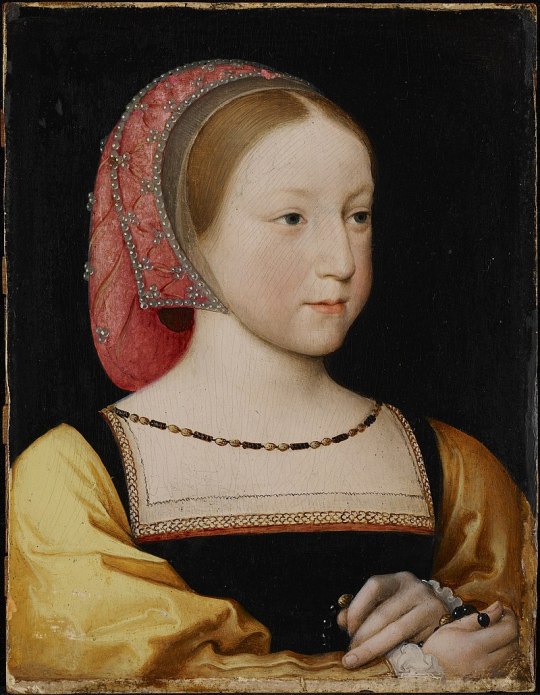
Charlotte of France (23 October 1516 – 18 September 1524) was the second child and second daughter of King Francis I and his wife Claude.
32 notes
·
View notes
Text
Favorite royals who were devoted mothers (5/5)
Catherine de Médici, Queen of France.
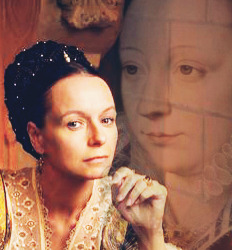
4 notes
·
View notes
Photo
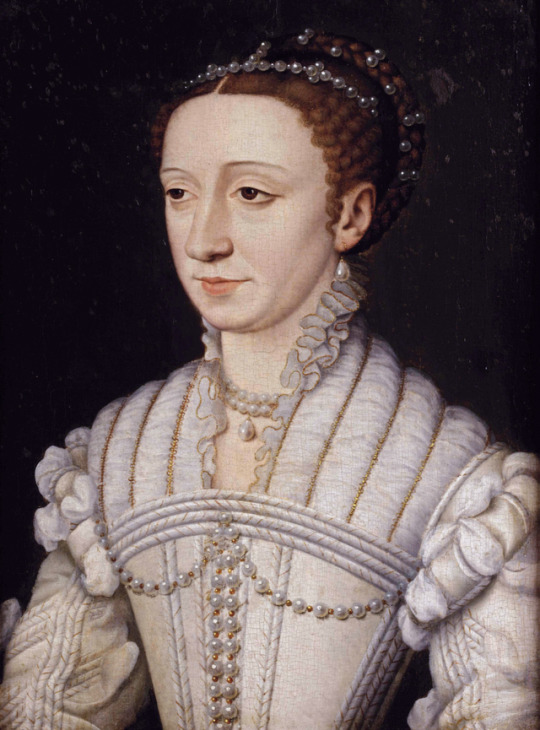
Margaret of France, Duchess of Berry, by Francois Clouet.
#margaret of france#duchess of berry#francois clouet#french monarchy#duchess of savoy#house of valois angouleme#long live the queue
20 notes
·
View notes
Photo
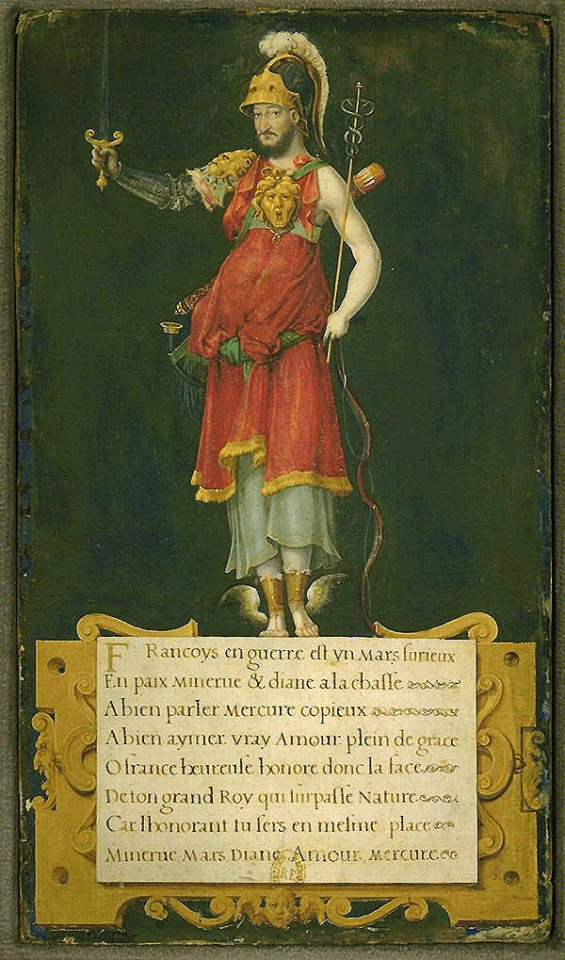
“In this painting, the king, Francis I (1515–1547), wears Minerva's helmet, Mars's armor, Mercury's winged sandals and his staff, Diana's hunting horn, and Cupid's bow and quiver; and a Medusa's head adorns his breastplate. This elevation of the monarch into a superman with the attributes of the Olympic gods was typical of royal iconography in the sixteenth and seventeenth centuries.”
~François Ier en déité (Francis I as a God), mid-1540s, Department of Prints and Photographs, Na 255 Rés., Parchment glued on oak panel~
Link: http://www.loc.gov/exhibits/bnf/bnf0004.html#obj62
5 notes
·
View notes
Text
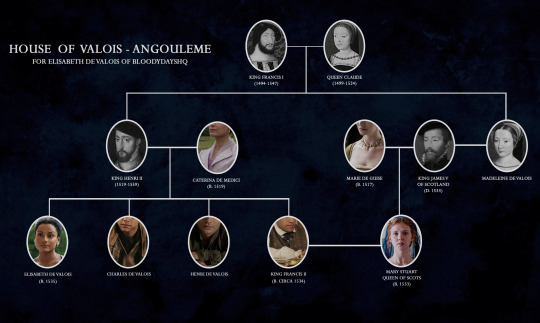
HOUSE OF VALOIS-ANGOULEME | Family Tree
(feat. @scotsq)
Notable connected families: Guise, Medici, Stuart Family motto: - Family symbols: Three golden fleurs-de-lis on a blue field
#PHEW NO MORE TREES#also i know charles and little henri are not in play yet but......#bd.challenge#edits.#muse.#& mary queen of scots.#& caterina de medici.
8 notes
·
View notes
Note
Which would be, in your opinion the top 5 false things/ideas about the House of Valois-Angouleme that people assume and should be corrected?
it really depends i guess… It depends of what ‘most people’ assume and who ‘most people’ are. Are they interested in history at all and just not specialists in the period? Do they only care about trivia you hear on TV? From the top of my head i think some of the trivia things would include stuff like ‘Francis’ court was opened to everyone, rich or poor’ and ‘Margot’s life is what makes the stuff of romantic novels’, and historically inacurrate informations would include things such as ‘Catherine ordered the Saint-Barthélémy massacre’ and basically anything related to Catherine in general imo
6 notes
·
View notes
Photo
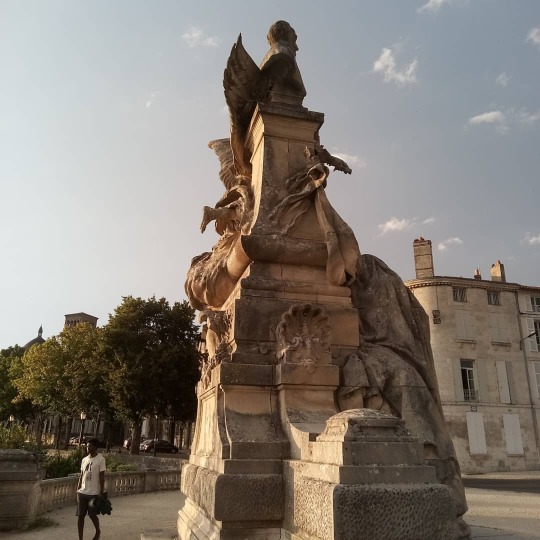
The first European visitor to New York City #nyc was Giovanni da Verrazzano, an Italian in command of the French ship La Dauphine in 1524. It is believed he sailed into Upper New York Bay, where he encountered native Lenape, returned through the Narrows, where he anchored the night of April 17, and left to continue his voyage. He named the area New Angoulême (French: Nouvelle-Angoulême) in honor of Francis I, King of France of the royal house of Valois-Angoulême and who had been Count of Angoulême from 1496 until his coronation in 1515.The name refers to the town of Angoulême, in the Charente département of France. For the next century, the area was occasionally visited by fur traders or explorers, such as by Esteban Gomez in 1525. #angouleme #newyork (à Angoulême Place New-york) https://www.instagram.com/p/CD9KaSbqOkO/?igshid=1b7lgsy6t5ro7
0 notes
Photo
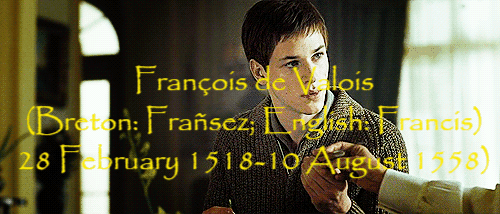

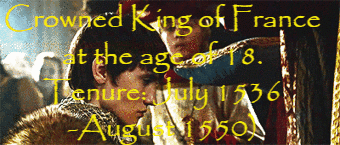

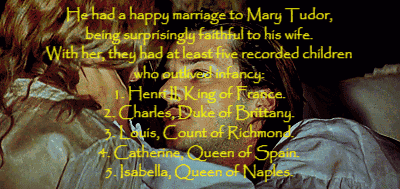

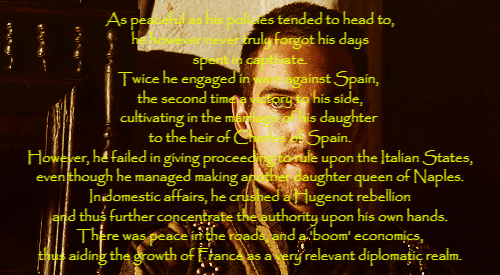
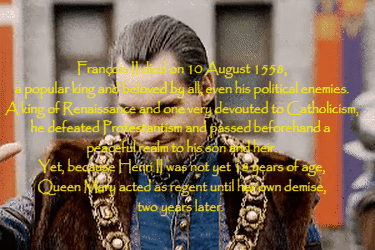
Tʜᴇ AU I·ᴅ ʟɪᴋᴇ ᴛᴏ sᴇᴇ﹐ ᴘᴀʀᴛ VII: Fʀᴀɴᴄ̧ᴏɪs II﹐ Kɪɴɢ ᴏғ Fʀᴀɴᴄᴇ.
[ 𝐺𝑎𝑠𝑝𝑎𝑟𝑑 𝑈𝑙𝑙𝑖𝑒𝑙 𝑎𝑠 𝐷𝑢𝑘𝑒 𝐹𝑟𝑎𝑛𝑐̧𝑜𝑖𝑠/𝑦𝑜𝑢𝑛𝑔 𝐾𝑖𝑛𝑔 𝐹𝑟𝑎𝑛𝑐̧𝑜𝑖𝑠 𝐼𝐼.
𝐽𝑜𝑛𝑎𝑡𝘩𝑎𝑛 𝑅𝘩𝑦𝑠-𝑀𝑒𝑦𝑒𝑟𝑠 𝑎𝑠 𝑜𝑙𝑑𝑒𝑟 𝐾𝑖𝑛𝑔 𝐹𝑟𝑎𝑛𝑐̧𝑜𝑖𝑠 𝐼𝐼 𝑜𝑓 𝐹𝑟𝑎𝑛𝑐𝑒.]
#Alternative History#historical au#François de Valois#Francis of Valois#Francis duke of Brittany#Duc de Bretagne#Francis III#François III#what if#son of#François I#Francis I#King of France#and#Claude of France#Queen Claude#House of Valois-Angouleme#House of Valois#Valois dynasty#Mary Tudor#Queen Mary I#Marie d'Angleterre#Tudor dynasty#House of Tudor#Tudors#The Tudors#Tudor#Gaspard Ulliel#as#Dauphin François
22 notes
·
View notes
Photo
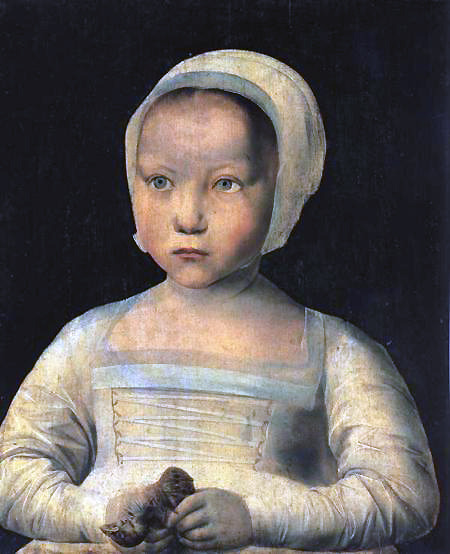
Louise of France (c. 19 August 1515 – 21 September 1518), was the eldest child of King Francis I of France and his first wife, Claude of France. She died in infancy, but was betrothed to Charles I of Spain for much of her life.
3 notes
·
View notes
Photo
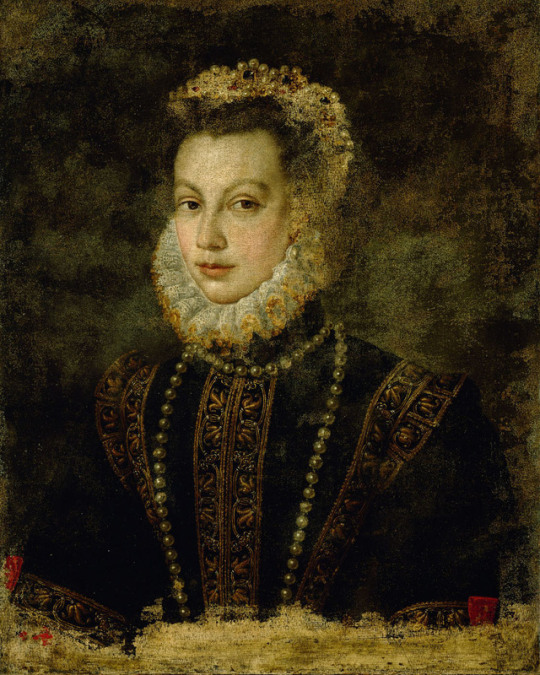
Elisabeth of Valois, Queen of Spain as the third wife of Philip II.
#elisabeth of valois#spanish monarchy#house of valois angouleme#french monarchy#queen of spain#long live the queue
31 notes
·
View notes